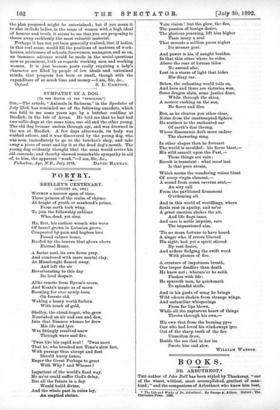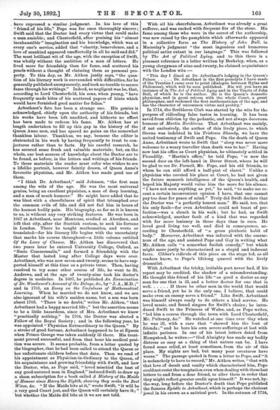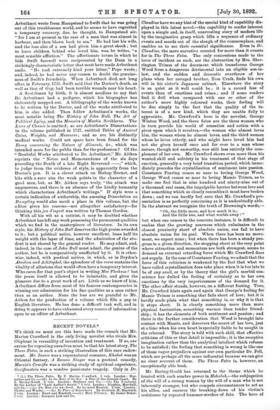BOOKS.
DR. ARBUTHNOT.* THE author of John Bull has been styled by Thackeray, "one of the wisest, wittiest, most accomplished, gentlest of man- kind ; " and the companions of Arbuthnot who knew him best,
• The Life and Works of Dr. Arbuthnot. By George A. Aitken. Oxford : The Clarendon Press. 1892.
_ have expressed a similar judgment. In his love of this "friend of his life," Pope was for once thoroughly sincere ; Swift said that the Doctor had every virtue that could make a man amiable; and Chesterfield, after praising his "almost inexhaustible" imagination and his knowledge, which was at every one's service, added that "charity, benevolence, and a love of mankind appeared unaffectedly in all he said and did." The most brilliant wit of the age, with the exception of Swift, was wholly without the ambition of a man of letters. He lived more for friendship than for fame, and scattered his pearls without a thought of claiming them as personal pro- perty. To this day, as Mr. Aitken justly says, "the ques- tion of his literary work is surrounded with difficulties, for he generally published anonymously, and took no trouble to secure fame through his writings." Indeed, so negligent was he, that, according to Lord Chesterfield, his sons, when young, "have frequently made kites of his scattered papers of hints which would have furnished good matter for folios."
Arbuthnot's fate has been a strange one. His genius is acknowledged, chiefly upon the authority of his friends, but his works have been left unedited, and hitherto no effort has been made to redeem his fame. Mr. Aitken has at length undertaken to fill up this gap in the history of the Queen Anne men, and has spared no pains on the somewhat thankless labour. Thankless, we say, because the editor is obstructed in his work by having frequently to trust to con- jectures rather than to facts. By his careful research, he has secured some fresh and valuable materials ; but, on the whole, our beat sources of knowledge about the Doctor are to be found, as before, in the letters and writings of his friends. To these materials the reader must refer who wishes to see a lifelike portrait, however faintly drawn, of Queen Anne's favourite physician, and Mr. Aitken has made good use of them.
"I think Dr. Arbuthnot," said Johnson, "the first man among the wits of the age. He was the most universal genius, being an excellent physician, a man of deep learning, and a man of much humour." He might have added that he was blest with a cheerfulness of spirit that triumphed over the common evils of life, and did not fail him in hours of the keenest bodily pain. His biography, so far as it is known to us, is without any very striking features. He was born in 1667 at Arbuthnot, near Montrose, studied at Aberdeen, and left that city, after the Scottish custom, to seek his fortune in London. There he taught mathematics, and wrote or translated—for his literary life begins with the uncertainty that marks his course throughout—a little volume entitled Of the Laws of Chance. Mr. Aitken has discovered that two years later he entered University College, Oxford, as "Soeio Commensalis," and formed a friendship with the Master that lasted long after College days were over. Arbuthnot, who was now seven-and-twenty, seems to have sup- ported himself at this time as a private tutor. Then, having resolved to try some other course of life, he went to St. Andrews, and at the age of twenty-nine took his doctor's degree in medicine. In 1697, he published An Examination of Dr. Woodward's Account of the Deluge, &c., by" J. A., M.D. ;" and in 1701, an Essay on the Usefulness of Mathematical Learning. When he married we do not know, and we are also ignorant of his wife's maiden name, but a son was born about 1703. "There is no doubt," writes Mr. Aitken, "that Arbuthnot had a happy married life ;" but the assertion seems to be a little hazardous, since of Mrs. Arbuthnot we know "practically nothing." In 1704, the Doctor was elected a Fellow of the Royal Society ; and in the following year, he was appointed "Physician Extraordinary to the Queen." By a stroke of good fortune, Arbuthnot happened to be at Epsom when Prince George was taken suddenly ill there. His treat- ment proved successful, and from that hour his medical posi- tion was secure. It seems probable, from a letter quoted by the biographer, that he had been called to attend the Queen or her unfortunate children before that date. Then we read of his appointment as Physician-in-Ordinary to the Queen, of his acquaintance and growing friendship with Swift, and how the Doctor, who, as Pope said, "loved mischief the best of any good-natured man in England," induced Swift to draw up a sham subscription for a book called A History of the Maids of Honour since Harry the Eighth, showing they make the Best Wives, Ste. "If the Maids bite at it," wrote Swift, "it will be a very good Court jest, and the Queen will certainly have it ; " but whether the Maids did bite at it we are not told. With all his cheerfulness, Arbuthnot was already a great sufferer, and was racked with frequent fits of the stone. His fame among those who were in the secret of the authorship, was now raised by the pamphlets which afterwards appeared in a collective form as The History of John Bull, in Macaulay's judgment "the most ingenious and humorous political satire extant in Our language." This was followed by The Art of Political Lying, and to this there is a pleasant reference in a letter written by Berkeley, when, as a young clergyman of nine-and-twenty, he claimed acquaintance with the London wits :—
"This day I dined at Dr. Arbuthnot's lodging in the Queen's Palace Dr. Arbuthnot is the first proselyte I have made of the Treatise I came over to print (dialogue between Hyls.a and Philonous), which will be soon published. His wit you have an instance of in The Art of Political Lying and in the Tracts of John Bull, of which he is the author. He is the Queen's domestic physician, and in great esteem with the whole Court, a great philosopher, and reckoned the first mathematician of the age, and has the character of uncommon virtue and probity."
In 1714, the Scriblerus Club was started by the wits for the purpose of ridiculing false tastes in learning. It has been saved from oblivion by the pedantic, and not always decorous, humour of Martin Scriblerus. That Arbuthnot was mainly, if not exclusively, the author of this lively piece, to which Sterne was indebted hi his Tristram Shandy, we have the united testimony of Swift and Pope. On the death of Queen Anne, Arbuthnot wrote to Swift that "sleep was never more welcome to a weary traveller than death was to her." Having now lost his office as Court physician, he ultimately settled in Piccadilly. "Martin's office," he told Pope, "is now the second door on the left-hand in Dover Street, where he will be glad to see Dr. Parnell, Mr. Pope, and his old friends, to.
whom he can still afford a half-pint of claret." -Unlike a
physician who coveted his place at Court, he had not given the future monarch intelligence of the Queen's health, and hoped his Majesty would value him the more for his silence. "I have not seen anything as yet," he said, "to make me re- cant a certain inconvenient opinion I have, that one cannot pay too dear for peace of mind." Truly did Swift declare that the Doctor was "a perfectly honest man." He said, too, that his only fault—for even Arbuthnot could not boast of per- fection—was a slouch in his walk ; but he had, as Swift acknowledged, another fault of a kind that was regarded with far more leniency in those days than in ours. He loved good living too well, and died in consequence, ac- cording to Chesterfield, of "a gross plethoric habit of body." Moreover, Arbuthnot was infected with the coarse- ness of the age, and assisted Pope and Gay in writing what Mr. Aitken calls "a somewhat foolish comedy," but which might more justly be characterised as a stupid and indecent farce. Cibber's ridicule of this piece on the stage led, as all readers know, to Pope's lifelong quarrel with the lively dramatist.
With Arbuthnot the tricky, irritable poet never had, if his report may be credited, the shadow of a misunderstanding. He thought this friend of his life "as good a doctor as any man for one that is ill, and a better doctor for one that is well If there be other men in the world that would serve a friend, yet he is the only one, I believe, that could make even an enemy serve a friend." Like Swift, Arbuthnot was himself always ready to do others a kind service. He loved music, and found singers for Swift's choirs ; he intro- duced Swift to the Princess of Wales, and, as Pope writes, "led him a course through the town with Lord Chesterfield, Mr. Pulteney, &o." He watched at one time over Gay when he was ill, with a care that "showed him the beat of friends ; " and he bore his own severe sufferings at last with infinite patience. In one of his latest letters dated from Hampstead, he writes :—" God Almighty has made my bodily distress as easy as a thing of that nature can be. I have found some relief, at least sometimes, from the air of this place. My nights are bad, but many poor creatures have worse." The passage quoted is from a letter to Pope, and "it is melancholy to have to record," Mr. Aitken writes, "that with that love of deceit and vanity which characterised him, Pope could not resist the temptation even when dealing with these last letters to and from a dear friend, to alter them in order that they might reflect greater credit upon himself." It was not, by- the-way, long before the Doctor's death that Pope published the famous Epistle to Arbuthnot, which is perhaps the choicest jewel in his crown as a satirical poet. In the autumn of 1734, Arbuthnot wrote from Hampstead to Swift that he was going out of this troublesome world, and he seems to have regretted a temporary recovery, due, he thought, to Hampstead air, "for I am at present in the case of a man that was almost in harbour, and then blown back to sea." He had lost his wife, and the loss also of a son had given him a great shock ; but to leave children behind who loved him, was, he writes, "a most sensible affliction." The affectionate terms in which he bids Swift farewell were reciprocated by the Dean in a strikingly characteristic letter that must have made Arbuthnot smile. "He took extremely kind your letter," Pope wrote ; and, indeed, he had never any reason to doubt the genuine- ness of Swift's friendship. When Arbuthnot died, not long after, in February, 1735, Swift said that the Doctor's death, as well as that of Gay, had been terrible wounds near his heart.
A Scot-313mm by birth, it is almost needless to say that Dr. Arbuthnot had a pedigree, which his biographer has elaborately mapped out. A bibliography of the works known to be written by the Doctor, and of the works attributed to him, is also added. Then follow Arbuthnot's works, the most notable being The History of John Bull, The Art of Political Lying, and the Memoirs of Martin Scriblerus. The Laws of Chance is omitted ; so are Arbuthnot's Dissertations in the volume published in 1727, entitled Tables of Ancient Coins, Weights, and Measures ; and so are his distinctly medical works. Could not space have been found for the Essay concerning the Nature of Aliments, &c., which was intended more for the public than for the profession? Of the 4' Doubtful Works attributed to Dr. Arbuthnot," Mr. Aitken reprints the "Notes and Memorandums of the six days preceding the Death of a late Right Reverend —," which, to judge from the evidence of Style, is apparently from the Doctor's pen. It is a clever attack on Bishop Burnet, and hits with a sure aim the weak points in the character of a good man, but, as Mr. Aitken says truly, "the attack was ungenerous, and there is an absence of the kindly humanity which characterises Arbuthnot's writings." If style were a certain indication of authorship, the amusing Dissertation on Dumpling would also merit a place in this volume, but the editor gives his reasons—not altogether satisfactory—for thinking this jeu d'esprit was written by Thomas Gordon.
With all his wit as a satirist, it may be doubted whether Arbuthnot has left any work possessing the permanent qualities which we find in the masterpieces of literature. In its own style, his History of John Bull deserves the high praise awarded to it ; but a political satire, however excellent, loses half its weight with the lapse of time, and the admiration of the stu- dent is not shared by the general reader. He may admit, and, indeed, in the case of John Bull must admit, the genius of the author, but he is comparatively unaffected by it. It is other- wise, indeed, with poetical satires, in which, as in Dryden's Absolom and Achitophel, the splendour of the verse sustains the vitality of allusions that would often have a temporary interest. Who cares for that poet's object in writing Mac Flecknoe? but the poem itself is allowed to be inimitable, and gives the pleasure due to a great work of art. Little as we know of him, Arbuthnot differs from most of his famous contemporaries in winning our admiration for his fine qualities as a man rather than as an author. None the less are we grateful to Mr. Aitken for the production of a volume which fills a gap in English literature. He has done a difficult task well, and in doing it appears to have exhausted every source of information open to an editor of Arbuthnot.




































 Previous page
Previous page